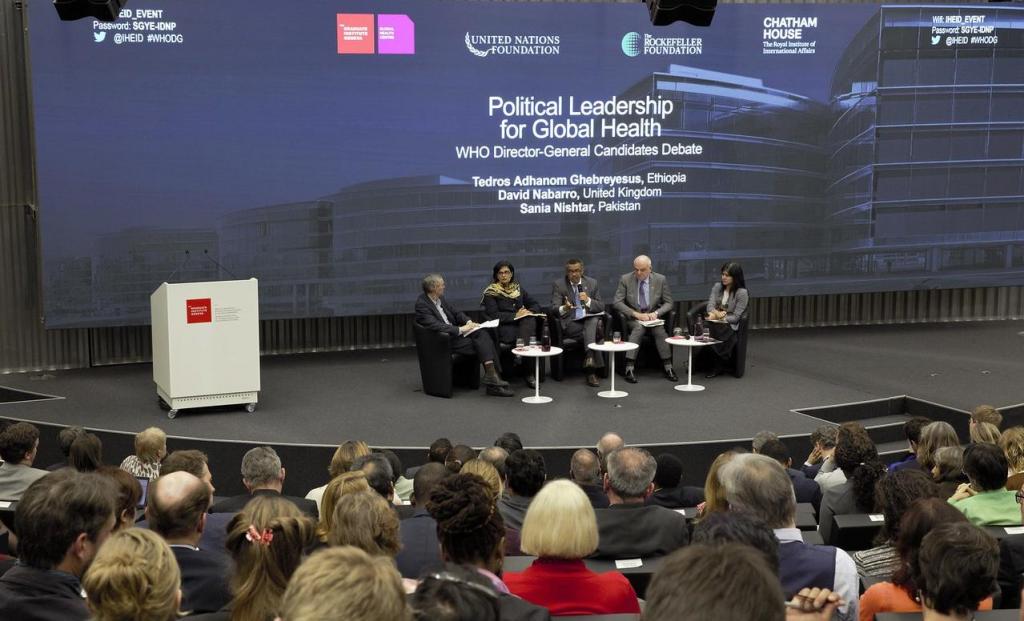For the first time all Member States will elect the new Director-General (DG) of the World Health Organization (WHO) at the World Health Assembly in May 2017. The WHO Executive Board in January of this year shortlisted three out of six candidates: Tedros Adhanom Ghebreyesus (nominated by the Government of Ethiopia), David Nabarro (nominated by the Government of the United Kingdom), and Sania Nishtar (nominated by the Government of Pakistan). The election process has been changed to include a more transparent process of presenting and interviewing the candidates, formally through WHO Member States, and at a number of public or semi-public fora - many of which have been webcast broadly. On 6 March 2017, three months before the election, a moderated discussion on “Political Leadership for Global Health” was held with the three candidates at the Graduate Institute, organised by the Global Health Centre, in cooperation with the Centre on Global Health Security at Chatham House, The Rockefeller Foundation and the United Nations Foundation.
The moderators, Andrew Jack from the Financal Times and Diah Saminarsih, Special Adviser to the Minister of Health of Indonesia, explored the different visions, qualities and skills of the three candidates, with the focus on political leadership rather than technical priorities. In answering to the many questions posed by the moderators, the candidates referred to their different experiences throughout their working life and kept the debate lively through sometimes punchy responses resonating well with the audience.
The candidates positioned themselves on a wide-range of issues, among others: on their vision to lead WHO; their strategies to promote inter-sectoral cooperation to address the impact of climate change on health; their views on engaging with the private sector, philanthropy and civil society; their suggestions for sustainable investments in financing for health and development and for funding the organisation; as well as their thoughts on the skills of the new leadership team. The relationship between the organisation and Member States was also addressed, in particular by hearing the candidates’ views on the role of the DG as head of a member-driven organisation, but also on how they will work with individual countries to mobilise domestic resources and fill the gaps towards universal health coverage.
The new leader of WHO must not only respond to key political challenges, such as health security and the 2030 Agenda for Sustainable Development, but also to effectively navigate a more fluid and less hierarchical governance environment. The global health community has an increased interest to better understand the processes shaping the political choices for or against health. In this regard, David Nabarro spoke of the interface of health and politics and the need to understand the relationship between power and health; Tedros Adhanom Ghebreyesus highlighted the political interventions that can enable health interventions; and Sania Nishtar outlined the high relevance of building institutions and systems, and cultivating individuals who exercise power in a fair, just and equitable manner.
At a time when questions are raised on the role of WHO, the next DG will also contribute to positioning the organisation within the global health landscape. On this point, David Nabarro addressed in particular the normative mandate of WHO and Tedros Adhanom Ghebreyesus the organisation’s priority-setting role at the international level, while Sania Nishtar also spoke of the need to speak out for the rights of the poorest.
Expectations for the next DG are high and the public event at the Graduate Institute generated much interest. More than 500 persons attended the event in Geneva and more than 1700 people watched the live webcast, which was made available in English, French and Spanish. The live and online audience tweeted for close to 1000 times during the event and the hashtag #WHODG used for the event trended in Switzerland. This unique opportunity facilitated a multi-stakeholder forum, which examined how the candidates envisage leading WHO, how they communicate to a wider audience, and how they address the political and commercial determinants of health. In doing so, the candidates’ debate was an important milestone in the history of WHO towards a more transparent organisation, and helped Member States to assess the candidates.
One final question remains: Will other organisations learn from this process and promote transparency and inclusion, while recognising the inherently political dimension of global health?


